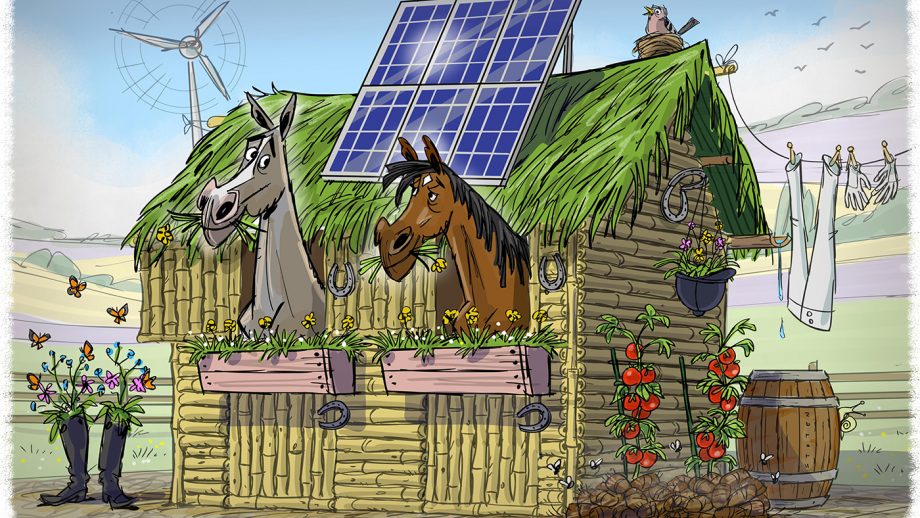With the challenge of climate change, what part are equestrian professionals playing to be more sustainable in their roles? Stephanie Bateman investigates
REDUCING the impact we have on our planet is a major global focus. While big equestrian brands and companies are playing their part to be more sustainable, what about individuals and smaller set-ups working in the industry?
Zoe Kiff set up Honest Riders Clothing in 2017 when looking for more sustainable riding kit for herself and care products for her horses.
“I realised that the options in the equestrian market were really limited, so decided to set up a brand whose sole focus was on providing more eco-friendly options,” says Zoe. “We consider our environmental impact at every step of the product journey.”
{"content":"PHA+RXZlcnkgcHJvZHVjdCBab2Ugc2VsbHMgaGFzIHRvIGJlIG1hZGUgdXNpbmcgdGhlIG1vc3Qgc3VzdGFpbmFibGUgZmFicmljIHRoZXkgY2FuIHNvdXJjZSwgZWl0aGVyIG9yZ2FuaWMgY290dG9uIG9yIHJlY3ljbGVkIHBvbHllc3Rlci4gSXQgaGFzIHRvIGJlIG1hZGUgYnkgYSBtYW51ZmFjdHVyZXIgd2hvc2Ugd29ya2VycyBhcmUgdHJlYXRlZCBhbmQgcGFpZCBmYWlybHksIGFuZCB3aGljaCBjb25zaWRlcnMgdGhlIGNhcmJvbiBvdXRwdXQgb2YgaXRzIGZhY3RvcnksIGFuZCB1c2VzIG1hdGVyaWFsIHNoaXBwZWQgdG8gaXQgcGxhc3RpYy1mcmVlLiBBbmQgdGhlIGNsb3RoaW5nIG11c3QgYmUgb2YgaGlnaCBxdWFsaXR5LCBzbyB0aGF0IGN1c3RvbWVycyBnZXQgeWVhcnMgb2Ygd2VhciBvdXQgb2YgaXQuPC9wPgo8cD5XaXRoIHJlZ2FyZHMgdG8gdGhlIGhvcnNlY2FyZSBwcm9kdWN0cywgWm9lIGVuc3VyZXMgdGhleSBhcmUgY3J1ZWx0eS1mcmVlLCBhcyBuYXR1cmFsIGFzIHBvc3NpYmxlIHRvIGF2b2lkIHRveGlucyBlbmRpbmcgdXAgaW4gd2F0ZXJ3YXlzLCBmcmVlIGZyb20gc29kaXVtIGxhdXJ5bCBzdWxmYXRlIChTTFMpLCBwYXJhYmVucywgcGV0cm9sZXVtIGFuZCBwYXJhZmZpbiwgYW5kIHdyYXBwZWQgaW4gcmVjeWNsYWJsZSBwYWNrYWdpbmcuPC9wPgo8cD48ZGl2IGNsYXNzPSJhZC1jb250YWluZXIgYWQtY29udGFpbmVyLS1tb2JpbGUiPjxkaXYgaWQ9InBvc3QtaW5saW5lLTIiIGNsYXNzPSJpcGMtYWR2ZXJ0Ij48L2Rpdj48L2Rpdj48c2VjdGlvbiBpZD0iZW1iZWRfY29kZS0zMSIgY2xhc3M9ImhpZGRlbi1tZCBoaWRkZW4tbGcgcy1jb250YWluZXIgc3RpY2t5LWFuY2hvciBoaWRlLXdpZGdldC10aXRsZSB3aWRnZXRfZW1iZWRfY29kZSBwcmVtaXVtX2lubGluZV8yIj48c2VjdGlvbiBjbGFzcz0icy1jb250YWluZXIgbGlzdGluZy0tc2luZ2xlIGxpc3RpbmctLXNpbmdsZS1zaGFyZXRocm91Z2ggaW1hZ2UtYXNwZWN0LWxhbmRzY2FwZSBkZWZhdWx0IHNoYXJldGhyb3VnaC1hZCBzaGFyZXRocm91Z2gtYWQtaGlkZGVuIj4NCiAgPGRpdiBjbGFzcz0icy1jb250YWluZXJfX2lubmVyIj4NCiAgICA8dWw+DQogICAgICA8bGkgaWQ9Im5hdGl2ZS1jb250ZW50LW1vYmlsZSIgY2xhc3M9Imxpc3RpbmctaXRlbSI+DQogICAgICA8L2xpPg0KICAgIDwvdWw+DQogIDwvZGl2Pg0KPC9zZWN0aW9uPjwvc2VjdGlvbj48L3A+CjxwPuKAnExhc3QgeWVhciB3ZSBsYXVuY2hlZCBhIGhvcnNlIHNoYW1wb28gYmFyIHdoaWNoIGlzIG1hZGUgZnJvbSBuYXR1cmFsIGluZ3JlZGllbnRzIGFuZCBjb21lcyBpbiBjb21wb3N0YWJsZSBwYWNrYWdpbmcs4oCdIHNheXMgWm9lLiDigJxJdOKAmXMgbm8gbG9uZ2VyIGVub3VnaCBmb3IgYSBicmFuZCB0byBsYWJlbCBpdHNlbGYgb3IgaXRzIHByb2R1Y3RzIOKAmHN1c3RhaW5hYmxl4oCZIGlmIHRoZXkgaGF2ZW7igJl0IGNvbnNpZGVyZWQgZXZlcnkgZWxlbWVudC4gV2UgYmVsaWV2ZSB0aGF0IHRoZSBlcXVlc3RyaWFuIG1hcmtldCBpcyBiZWhpbmQgdGhlIHRpbWVzIHdoZW4gaXQgY29tZXMgdG8gY29uc2lkZXJpbmcgaXRzIGVudmlyb25tZW50YWwgaW1wYWN0LiBDbGltYXRlIGNoYW5nZSBpcyBzdWNoIGEgaHVnZSBpc3N1ZSB0aGF0IHdlIGJlbGlldmUgaXTigJlzIG91ciByZXNwb25zaWJpbGl0eSBhcyBjdXN0b21lcnMgYW5kIGFzIGJyYW5kcyB0byBhY3Qgbm93LuKAnTwvcD4KPHA+Rk9SIHNvbWUsIHN1c3RhaW5hYmlsaXR5IGlzbuKAmXQgYSBuZXcgY29uY2VwdC4gUG9zdGFsIHdvcm0gZWdnIGNvdW50IGNvbXBhbnkgV2VzdGdhdGUgTGFicyBoYXMgYmVlbiBjaGFtcGlvbmluZyBzdXN0YWluYWJsZSBob3JzZSBoZWFsdGggZm9yIDIyIHllYXJzIGFuZCwgZHVyaW5nIGxvY2tkb3duLCBpbnZlc3RlZCBpbiBhIG5ldyByYW5nZSBvZiBlbnZpcm9ubWVudGFsbHkgZnJpZW5kbHkgcGFja2FnaW5nLjwvcD4KPHA+4oCcVGhlIGlubm92YXRpdmUgZGVzaWduIG9mIG91ciBsYWIgdGVzdGluZyBraXRzIHRyYW5zZm9ybXMgdGhlIGJpb2RlZ3JhZGFibGUgcHJvZHVjdCBwb3VjaGVzIGludG8gYSByZXR1cm4gZW52ZWxvcGUgdG8gc2VuZCB0aGUgYW5pbWFsIHNhbXBsZXMgYmFjayB0byB0aGUgbGFib3JhdG9yeSBmb3IgdGVzdGluZyzigJ0gZXhwbGFpbnMgQ2xhaXJlIFNoYW5kLCBkaXJlY3RvciBvZiBtYXJrZXRpbmcgYXQgV2VzdGdhdGUgTGFicy4g4oCcVGhpcyB3YXksIHdl4oCZcmUgcmVzcG9uc2libGUgZm9yIHRoZSBmdWxsIGpvdXJuZXkgb2YgdGhlIHByb2R1Y3QgYXMgZXZlcnl0aGluZyBjYW4gYmUgcmV0dXJuZWQgdG8gc291cmNlLuKAnTwvcD4KPGRpdiBjbGFzcz0iYWQtY29udGFpbmVyIGFkLWNvbnRhaW5lci0tbW9iaWxlIj48ZGl2IGlkPSJwb3N0LWlubGluZS0zIiBjbGFzcz0iaXBjLWFkdmVydCI+PC9kaXY+PC9kaXY+CjxwPlNvbWUgMTIgbW9udGhzIG9uIGZyb20gdGhlIGxhdW5jaCwgdGhvdXNhbmRzIG9mIHBvdWNoZXMgaGF2ZSBiZWVuIHJldHVybmVkIHRocm91Z2ggdGhlIHBvc3QgdG8gYmUgY29tcG9zdGVkIG9uIHRoZSBmYW1pbHkgZmFybSB3aGVyZSB0aGUgbGFiIGlzIGJhc2VkLjwvcD4KPHA+4oCcVGhlIGludGVudGlvbiBpcyBmb3IgdGhlIG1hdGVyaWFsIHRvIGJlIHVzZWQgZm9yIG5ldyB0cmVlLXBsYW50aW5nIG9uIGEgNzMtYWNyZSByZXNlcnZlIHRoYXQgd2XigJlyZSBlc3RhYmxpc2hpbmcgb24gcmVjbGFpbWVkIG9wZW4tY2FzdCBsYW5kLOKAnSBzYXlzIENsYWlyZS4g4oCcT3ZlciB0aGUgcGFzdCBjb3VwbGUgb2YgeWVhcnMsIHdl4oCZdmUgcmVkdWNlZCB0aGUgYW1vdW50IG9mIHJ1YmJpc2ggZ29pbmcgdG8gbGFuZGZpbGwgYnkgbW9yZSB0aGFuIDc1JS4gV2hhdCB3ZSBjYW7igJl0IGNvbXBvc3Qgd2UgcmVjeWNsZSB3aGVyZXZlciBwb3NzaWJsZS4gSXTigJlzIGFsbCB0aGUgbGl0dGxlIHRoaW5ncyBsaWtlIGVuc3VyaW5nIGV2ZXJ5IGFkZGl0aW9uYWwgc3RpY2tlciBvbiBhIGNvbXBvc3RhYmxlIGVudmVsb3BlIGlzIHByaW50ZWQgb24gdGhlIHJpZ2h0IGdyYWRlIG9mIG1hdGVyaWFsIGFuZCB3aXRoIHZlZ2V0YWJsZSBpbmsgc28gdGhhdCBubyBuYXN0aWVzIGxlYWNoIGludG8gdGhlIHNvaWwuIFRoZSBlbnZpcm9ubWVudCBpcyByZWFsbHkgaW1wb3J0YW50IHRvIHVzIGhlcmUgYXQgV2VzdGdhdGUsIHNvIHdlIGNvbnRpbnVlIHRvIHRha2UgZXZlcnkgc3RlcCB3ZSBjYW4gdG8gcHJvdGVjdCBpdC7igJ08L3A+CjxkaXYgY2xhc3M9ImFkLWNvbnRhaW5lciBhZC1jb250YWluZXItLW1vYmlsZSI+PGRpdiBpZD0icG9zdC1pbmxpbmUtNCIgY2xhc3M9ImlwYy1hZHZlcnQiPjwvZGl2PjwvZGl2Pgo8cD5DSEFOR0VTIGFyZSBoYXBwZW5pbmcgaW4gcGxhY2VzIG9mIGVkdWNhdGlvbiB0b28sIGFzIGVxdWluZSBsZWN0dXJlciBhdCBCcmlkZ2VuZCBDb2xsZWdlIFN1ZSBIdXJmb3JkIHNheXMuPC9wPgo8cD7igJxTdXN0YWluYWJpbGl0eSBoYXMgYmVjb21lIHNvbWV0aGluZyBvZiBhIGJ1enogd29yZCBpbiB0aGUgZWR1Y2F0aW9uIHNlY3RvciwgYW5kIGF0IEJyaWRnZW5kIENvbGxlZ2Ugd2XigJl2ZSBpbmNvcnBvcmF0ZWQgc3VzdGFpbmFiaWxpdHkgaW50byB0aGUgc3RyYXRlZ2ljIHBsYW4gZm9yIHRoZSBidXNpbmVzcywgaW5jbHVkaW5nIHBsYW5zIHRvIGJlIHBhcGVybGVzcyBieSAyMDI1LOKAnSBzaGUgc2F5cy4g4oCcQmxlbmRlZCBsZWFybmluZyB0aW1ldGFibGVzIHdpbGwgYmUgdXRpbGlzZWQgZm9yIGFsbCBsZWFybmVycyB3aXRoIGEgY29tYmluYXRpb24gb2Ygb25saW5lIGFuZCBmYWNlLXRvLWZhY2UgdGVhY2hpbmcuIFRoaXMgd2lsbCBub3Qgb25seSBhbGxvdyBmb3IgZnVydGhlciBwcm9ncmVzc2lvbiB0b3dhcmQgYmVpbmcgcGFwZXJsZXNzLCBidXQgd2lsbCBhbHNvIGFsbG93IGZvciBtYXNzaXZlIHJlZHVjdGlvbnMgaW4gb3VyIGNhcmJvbiBmb290cHJpbnQgd2l0aCBmZXdlciBjYXJzLCBsZXNzIHRyYXZlbCBhbmQgYSByZWR1Y3Rpb24gaW4gZW5lcmd5IHVzYWdlLiBXZSB3aWxsIGFsc28gc29vbiBoYXZlIGVsZWN0cmljIGNoYXJnZSBwb2ludHMgYXQgdGhlIGNvbGxlZ2Uu4oCdPC9wPgo8ZGl2IGNsYXNzPSJhZC1jb250YWluZXIgYWQtY29udGFpbmVyLS1tb2JpbGUiPjxkaXYgaWQ9InBvc3QtaW5saW5lLTUiIGNsYXNzPSJpcGMtYWR2ZXJ0Ij48L2Rpdj48L2Rpdj4KPHA+U3VzdGFpbmFiaWxpdHkgaGFzIGFsc28gYmVjb21lIGEga2V5IHdvcmQgaW4gRXN0eW4gKFdhbGVz4oCZIHZlcnNpb24gb2YgT2ZzdGVkKSBpbnNwZWN0aW9ucywgd2l0aCBsZWN0dXJlcnMgZW5jb3VyYWdlZCB0byB0ZWFjaCBhbmQgZWR1Y2F0ZSBsZWFybmVycyBvbiBzdXN0YWluYWJpbGl0eS48L3A+CjxwPuKAnFRoZSB5b3VuZ2VyIGdlbmVyYXRpb24gYXJlIG1vcmUgYXdhcmUgb2Ygc3VzdGFpbmFiaWxpdHkgYW5kIG1vcmUgc2tpbGxlZCBhbmQgd2lsbGluZyB0byB1c2UgdGVjaG5vbG9neSzigJ0gc2F5cyBTdWUuIOKAnFRoZSBiaWdnZXN0IGNoYWxsZW5nZSBpcyB0cmFpbmluZyBzdGFmZiBpbiBuZXcgd2F5cyBvZiB3b3JraW5nLCBlc3BlY2lhbGx5IGluIElDVCBbaW5mb3JtYXRpb24gYW5kIGNvbW11bmljYXRpb25zIHRlY2hub2xvZ3ldLuKAnTwvcD4KPHA+RXh0cmEgdHJhaW5pbmcgYW5kIElDVCBlcXVpcG1lbnQgY2FycmllcyBhIGNvc3QsIGJ1dCB0aGUgc2F2aW5ncyBoYXZlIGJlZW4gYWxtb3N0IMKjMjBrIGluIHByaW50aW5nIGFsb25lIGluIGEgdGhyZWUtbW9udGggcGVyaW9kLjwvcD4KPHA+4oCcV2UgYWxzbyBtYW5hZ2Ugb3VyIGxhbmQgc3VzdGFpbmFibHkgd2l0aCBhcmVhcyBzZXQgYXNpZGUgZm9yIG5hdHVyYWwgYmlvZGl2ZXJzZSBoYWJpdGF0cyzigJ0gYWRkcyBTdWUuIOKAnFdlIGVuY291cmFnZSByZWN5Y2xpbmcgaW4gYWxsIGFyZWFzLiBJbiB0aGUgZXF1aW5lIHNlY3RvciwgdGhlIG9yZ2FuaWMgd2FzdGUgaXMgdXNlZCB0byBmZXJ0aWxpc2UgdGhlIGxhbmQu4oCdPC9wPgo8cD48aW1nIGZldGNocHJpb3JpdHk9ImhpZ2giIGRlY29kaW5nPSJhc3luYyIgY2xhc3M9Imxhenlsb2FkIGJsdXItdXAgYWxpZ25ub25lIHNpemUtZnVsbCB3cC1pbWFnZS03NDQ0MjIiIGRhdGEtcHJvY2Vzc2VkIHNyYz0iaHR0cHM6Ly9rZXlhc3NldHMudGltZWluY3VrLm5ldC9pbnNwaXJld3AvbGl2ZS93cC1jb250ZW50L3VwbG9hZHMvc2l0ZXMvMTQvMjAxNy8wMy9uZXctaGgtcGxhY2Vob2xkZXItMjAweDIwMC5wbmciIGRhdGEtc3JjPSJodHRwczovL2tleWFzc2V0cy50aW1laW5jdWsubmV0L2luc3BpcmV3cC9saXZlL3dwLWNvbnRlbnQvdXBsb2Fkcy9zaXRlcy8xNC8yMDIxLzA0L0hBSDMwMy5mdF9zdXN0YWluYWJsZXdvcmsuaF9oX3N1c3RhaW5hYmlsaXR5X2F0X3dvcmtfc2Vjb25kYXJ5X2ZpbmFsX2FydF8wMzAzX2Rfc3RvdGVuX2NvbW0uanBnIiBhbHQ9IiIgd2lkdGg9IjE0MDAiIGhlaWdodD0iNzg4IiBkYXRhLXNpemVzPSJhdXRvIiBkYXRhLXNyY3NldD0iaHR0cHM6Ly9rZXlhc3NldHMudGltZWluY3VrLm5ldC9pbnNwaXJld3AvbGl2ZS93cC1jb250ZW50L3VwbG9hZHMvc2l0ZXMvMTQvMjAyMS8wNC9IQUgzMDMuZnRfc3VzdGFpbmFibGV3b3JrLmhfaF9zdXN0YWluYWJpbGl0eV9hdF93b3JrX3NlY29uZGFyeV9maW5hbF9hcnRfMDMwM19kX3N0b3Rlbl9jb21tLmpwZyAxNDAwdywgaHR0cHM6Ly9rZXlhc3NldHMudGltZWluY3VrLm5ldC9pbnNwaXJld3AvbGl2ZS93cC1jb250ZW50L3VwbG9hZHMvc2l0ZXMvMTQvMjAyMS8wNC9IQUgzMDMuZnRfc3VzdGFpbmFibGV3b3JrLmhfaF9zdXN0YWluYWJpbGl0eV9hdF93b3JrX3NlY29uZGFyeV9maW5hbF9hcnRfMDMwM19kX3N0b3Rlbl9jb21tLTMwMHgxNjkuanBnIDMwMHcsIGh0dHBzOi8va2V5YXNzZXRzLnRpbWVpbmN1ay5uZXQvaW5zcGlyZXdwL2xpdmUvd3AtY29udGVudC91cGxvYWRzL3NpdGVzLzE0LzIwMjEvMDQvSEFIMzAzLmZ0X3N1c3RhaW5hYmxld29yay5oX2hfc3VzdGFpbmFiaWxpdHlfYXRfd29ya19zZWNvbmRhcnlfZmluYWxfYXJ0XzAzMDNfZF9zdG90ZW5fY29tbS02MzB4MzU1LmpwZyA2MzB3LCBodHRwczovL2tleWFzc2V0cy50aW1laW5jdWsubmV0L2luc3BpcmV3cC9saXZlL3dwLWNvbnRlbnQvdXBsb2Fkcy9zaXRlcy8xNC8yMDIxLzA0L0hBSDMwMy5mdF9zdXN0YWluYWJsZXdvcmsuaF9oX3N1c3RhaW5hYmlsaXR5X2F0X3dvcmtfc2Vjb25kYXJ5X2ZpbmFsX2FydF8wMzAzX2Rfc3RvdGVuX2NvbW0tMTM1eDc2LmpwZyAxMzV3LCBodHRwczovL2tleWFzc2V0cy50aW1laW5jdWsubmV0L2luc3BpcmV3cC9saXZlL3dwLWNvbnRlbnQvdXBsb2Fkcy9zaXRlcy8xNC8yMDIxLzA0L0hBSDMwMy5mdF9zdXN0YWluYWJsZXdvcmsuaF9oX3N1c3RhaW5hYmlsaXR5X2F0X3dvcmtfc2Vjb25kYXJ5X2ZpbmFsX2FydF8wMzAzX2Rfc3RvdGVuX2NvbW0tMzIweDE4MC5qcGcgMzIwdywgaHR0cHM6Ly9rZXlhc3NldHMudGltZWluY3VrLm5ldC9pbnNwaXJld3AvbGl2ZS93cC1jb250ZW50L3VwbG9hZHMvc2l0ZXMvMTQvMjAyMS8wNC9IQUgzMDMuZnRfc3VzdGFpbmFibGV3b3JrLmhfaF9zdXN0YWluYWJpbGl0eV9hdF93b3JrX3NlY29uZGFyeV9maW5hbF9hcnRfMDMwM19kX3N0b3Rlbl9jb21tLTYyMHgzNDkuanBnIDYyMHcsIGh0dHBzOi8va2V5YXNzZXRzLnRpbWVpbmN1ay5uZXQvaW5zcGlyZXdwL2xpdmUvd3AtY29udGVudC91cGxvYWRzL3NpdGVzLzE0LzIwMjEvMDQvSEFIMzAzLmZ0X3N1c3RhaW5hYmxld29yay5oX2hfc3VzdGFpbmFiaWxpdHlfYXRfd29ya19zZWNvbmRhcnlfZmluYWxfYXJ0XzAzMDNfZF9zdG90ZW5fY29tbS05MjB4NTE4LmpwZyA5MjB3LCBodHRwczovL2tleWFzc2V0cy50aW1laW5jdWsubmV0L2luc3BpcmV3cC9saXZlL3dwLWNvbnRlbnQvdXBsb2Fkcy9zaXRlcy8xNC8yMDIxLzA0L0hBSDMwMy5mdF9zdXN0YWluYWJsZXdvcmsuaF9oX3N1c3RhaW5hYmlsaXR5X2F0X3dvcmtfc2Vjb25kYXJ5X2ZpbmFsX2FydF8wMzAzX2Rfc3RvdGVuX2NvbW0tMTIyMHg2ODcuanBnIDEyMjB3IiBzaXplcz0iKG1heC13aWR0aDogMTQwMHB4KSAxMDB2dywgMTQwMHB4IiAvPjwvcD4KPHA+U0hPVyB2ZW51ZXMgYXJlIGFsc28gc3RlcHBpbmcgdXAgdG8gdGhlIHN1c3RhaW5hYmlsaXR5IHBsYXRlLjwvcD4KPHA+VGluYSBVcmUgaXMgaW4gY2hhcmdlIG9mIEVseSBFdmVudGluZyBDZW50cmUsIGhvbWUgdG8gTGl0dGxlIERvd25oYW0gSG9yc2UgVHJpYWxzLCBhbmQgYSBidXN5IGJhc2UgZm9yIGNvYWNoaW5nIGRheXMgYW5kIGNsaW5pY3MuPC9wPgo8cD7igJxNYWtpbmcgdGhlIGJ1c2luZXNzIG1vcmUgc3VzdGFpbmFibGUgbWVhbnMgbG9va2luZyBhdCBpbnZlc3RtZW50cyBpbiBpbmZyYXN0cnVjdHVyZSB0aGF0IHdpbGwgaGVscCBtYWtlIHNhdmluZ3MgaW4gdGhlIGZ1dHVyZSwgYXMgd2VsbCBhcyBsb29raW5nIGF0IGhvdyB3ZSBjYW4gb3BlcmF0ZSBpbiBhIGdyZWVuZXIgYW5kIG1vcmUgc3VzdGFpbmFibGUgd2F5LOKAnSBzYXlzIFRpbmEuIOKAnFRvIGRvIHRoaXMsIHdl4oCZdmUgbG9va2VkIHRvIGRpZ2l0YWwgZGV2ZWxvcG1lbnRzLCByZW5ld2FibGUgZW5lcmd5IGFuZCBiaW9kZWdyYWRhYmxlIGJlZGRpbmcu4oCdPC9wPgo8cD5Hb2luZyBkaWdpdGFsIGZ1dHVyZS1wcm9vZnMgY2VydGFpbiBzeXN0ZW1zIGFuZCByZWR1Y2VzIHRoZSBhbW91bnQgb2YgcGFwZXIgdXNlZC48L3A+CjxwPuKAnEZvciBleGFtcGxlLCB3ZSBoYXZlIHJ1biBhbiBvbmxpbmUgYm9va2luZyBzeXN0ZW0gZm9yIHNldmVyYWwgeWVhcnMgYW5kIHRoaXMgbm93IHRha2VzIGNhcmUgb2Ygc3RhYmxlIGJvb2tpbmdzLCBjbGluaWNzIGFuZCBjb2FjaGluZyBhbmQgY3Jvc3MtY291bnRyeSBzY2hvb2xpbmcsIHNhdmluZyB0aW1lIGFuZCBlZmZvcnQs4oCdIHNheXMgVGluYS4g4oCcVGhlIEV2ZW50IEh1YiBsYXVuY2hlZCBpbiAyMDIwIGhhcyBlbmFibGVkIHVzIHRvIGhvc3QgY291cnNlIG1hcHMsIGV2ZW50IHByb2dyYW1tZXMsIGVzc2VudGlhbCBpbmZvcm1hdGlvbiBhbmQgYSBsb3Qgb2Ygc2lnbmFnZSBkaWdpdGFsbHkuIFdlIGFsc28gZGV2ZWxvcGVkIGEgZmVuY2UtanVkZ2luZyBhcHAu4oCdPC9wPgo8cD5UaGUgYnVsayBvZiB0aGUgc2l0ZSBhbHNvIHJ1bnMgb24gc29sYXIgcG93ZXIgZm9yIGEgbGFyZ2UgcGFydCBvZiB0aGUgeWVhciwgd2hpY2ggaXMgb25lIHJlYXNvbiB3aHkgdGhlcmUgaXNu4oCZdCBhbHdheXMgZW5vdWdoIHBvd2VyIGZvciBlbGVjdHJpYyBob29rLXVwIGF0IHNob3dzLjwvcD4KPHA+4oCcV2UgdXNlIHBlbGxldHMgb3Igb3RoZXIgYmVkZGluZyB0eXBlcywgc3VjaCBhcyBoZW1wLCB3aGljaCBpcyBxdWlja2VyIHRvIGJyZWFrIGRvd24s4oCdIGFkZHMgVGluYS4g4oCcV2Ugc3VwcGx5IHRyYXZlbCBtdWdzIGFuZCBmbGFza3MgdG8gb3VyIHZvbHVudGVlcnMgc28gdGhhdCB0aGV5IGNhbiByZS11c2UgdGhlbSBhbmQgdXNlIGJpb2RlZ3JhZGFibGUgbHVuY2ggYm94ZXMgdG8gZGVsaXZlciBqYWNrZXQgcG90YXRvZXMgdG8gdGhlIGNyb3NzLWNvdW50cnkganVtcCBqdWRnZXMsIHJhdGhlciB0aGFuIHBsYXN0aWMtd3JhcHBlZCBzYW5kd2ljaGVzLiBUaGUgYmlnZ2VzdCBjaGFsbGVuZ2UgaGFzIGJlZW4gY2hhbmdpbmcgcGVvcGxl4oCZcyBoYWJpdHMsIGJ1dCB0aGUgbW9yZSBwZW9wbGUgdmlzaXQgYW5kIGV4cGVyaWVuY2UgdGhlIGNoYW5nZXMsIHRoZSBtb3JlIHRoZXkgZW1icmFjZSB0aGVtLuKAnTwvcD4KPHA+U29jaWV0eSBvZiBNYXN0ZXIgU2FkZGxlcnMgKFNNUykgcXVhbGlmaWVkIHNhZGRsZSBmaXR0ZXIgUG9wcHkgV2ViYmVyIHJlY2VudGx5IGxhdW5jaGVkIFBlZVdlZSBMZWF0aGVyIENhcmUsIGEgYnJhbmQgb2YgbGVhdGhlciBjYXJlIHdpdGggc3VzdGFpbmFiaWxpdHkgYXQgdGhlIGZvcmVmcm9udC4gUG9wcHkgaGFzIGJlZW4gd29ya2luZyBpbiB0aGUgc2FkZGxlcnkgd29ybGQgZm9yIDE1IHllYXJzLCBhbmQga25vd3Mgd2hpY2ggcHJvZHVjdHMgYXJlIGJlc3Qgc3VpdGVkIHRvIGxlYXRoZXIuPC9wPgo8cD5Qb3BweeKAmXMgcHJvZHVjdHMgYXJlIGVjby1mcmllbmRseSwgbmF0dXJhbCBhbmQgY3J1ZWx0eS1mcmVlLjwvcD4KPHA+4oCcQWxsIHRoZSBpbmdyZWRpZW50cyBhcmUgMTAwJSBuYXR1cmFsIGFuZCBhbGwgb2Ygb3VyIHBhY2thZ2luZyBpcyBwbGFzdGljLWZyZWUgYW5kIGJpb2RlZ3JhZGFibGUs4oCdIGV4cGxhaW5zIFBvcHB5LiDigJxXZSBldmVuIG1ha2UgdGhlIHNwb25nZXMgb3V0IG9mIHdvb2QgcHVscCBhbmQgdGhlIGRpc3Bvc2FibGUgZ2xvdmVzIGZvciB0aGUgbGVhdGhlciBkeWUgYXJlIG1hZGUgb3V0IG9mIHN1Z2FyIGNhbmUu4oCdPC9wPgo8cD5TY2llbmNlIFN1cHBsZW1lbnRzIGlzIGFub3RoZXIgY29tcGFueSBjb21taXR0ZWQgdG8gcmVkdWNpbmcgcGxhc3RpYyBjb25zdW1wdGlvbi4gVGhlIGJyYW5kIGFscmVhZHkgdXNlcyAxMDAlIHBvc3QtY29uc3VtZXIgcmVjeWNsZWQgcGxhc3RpY3MgZm9yIHRoZWlyIHNoYW1wb28gYW5kIHNwcmF5IHJhbmdlLCBhbmQgaXMgdHJhbnNpdGlvbmluZyB0byByZWN5Y2xhYmxlIHBvdWNoZXMgZm9yIHRoZSBtYWpvcml0eSBvZiB0aGVpciBwcm9kdWN0cywgaW4gd2hhdCBHcm91cCBDRU8gRGF2aWQgTWl0c29uIGRlc2NyaWJlcyBhcyDigJxhbm90aGVyIGxlYXAgZm9yd2FyZCBpbiByZWR1Y2luZyB0aGUgaW1wYWN0IG9mIHNpbmdsZS11c2UgcGxhc3RpYyBvbiBvdXIgZW52aXJvbm1lbnTigJ0uPC9wPgo8cD5Tb21lIHByb2Zlc3Npb25zIHJlcXVpcmUgaG91cnMgb2YgdHJhdmVsLCB3aGljaCBpc27igJl0IGdyZWF0IGZvciByZWR1Y2luZyBjYXJib24gZm9vdHByaW50cywgYnV0IGZhcnJpZXIgSmFjayBDbGltbyBvdmVyY29tZXMgdGhpcyBieSB2YW4gc2hhcmluZyB3aXRoIGFub3RoZXIgZmFycmllci48L3A+CjxwPuKAnFdlIGhhdmUgY2xpZW50cyBhdCB0aGUgc2FtZSB5YXJkcywgc28gd2UgZHJpdmUgdG9nZXRoZXIgb24gY2VydGFpbiBkYXlzIHRvIHJlZHVjZSBjYXJib24gZW1pc3Npb25zLOKAnSBzYXlzIEphY2suIOKAnE9uIGRheXMgd2hlbiBJIHdvcmsgYWxvbmUsIEkgb3JnYW5pc2UgbXkgZGlhcnkgdG8gc2VlIGNsaWVudHMgaW4gdGhlIHNhbWUgYXJlYSwgcmF0aGVyIHRoYW4gZHJpdmluZyBhcm91bmQu4oCdPC9wPgo8cD5KYWNrIGFsc28gcmVjeWNsZXMgb2xkIHNob2VzIGFuZCBuYWlscywgYW5kIHRoZSBjYXJkYm9hcmQgYm94ZXMgdGhlIHNob2VzIGNvbWUgaW4uPC9wPgo8cD7igJxXaGVuIHdl4oCZdmUgZmluaXNoZWQgd2l0aCBvdXIgZ2FzIGJvdHRsZXMgdGhhdCB3ZSB1c2UgaW4gdGhlIGZvcmdlLCB0aGV5IGdldCBzZW50IGJhY2sgdG8gdGhlIHN1cHBsaWVycyBhbmQgYXJlIHJlcGxhY2VkIHdpdGggYSBmdWxsIG9uZSDigJMgdGhlIGVtcHR5IG9uZXMgYXJlIGZpbGxlZCBhbmQgcmV1c2VkLOKAnSBzYXlzIEphY2suIOKAnFNvbWUgc3VwcGxpZXJzIHBhY2sgdGhlIHNob2VzIGluIHBsYXN0aWMgYmFncyBhcyB3ZWxsIGFzIGNhcmRib2FyZCBib3hlcyB0byBwcmV2ZW50IHRoZSBzaG9lcyBydXN0aW5nLCBidXQgSSBkb27igJl0IGJlbGlldmUgaXTigJlzIG5lY2Vzc2FyeSBhbmQgcmVtb3ZpbmcgdGhlIHBsYXN0aWMgd291bGQgbWFrZSBpdCBtb3JlIGVudmlyb25tZW50YWxseSBmcmllbmRseS7igJ08L3A+CjxoMz7igJxTbWFsbCBjaGFuZ2VzIGFkZCB1cOKAnTwvaDM+CjxwPlNIT1dKVU1QRVIgPGEgaHJlZj0iaHR0cHM6Ly93d3cuaG9yc2VhbmRob3VuZC5jby51ay9hdXRob3IvY2FtaWxsYWJpbmdoYW0yIiB0YXJnZXQ9Il9ibGFuayIgcmVsPSJub29wZW5lciBub3JlZmVycmVyIj5DYW1pbGxhIEJpbmdoYW08L2E+IGlzIG9uIGEgc3VzdGFpbmFiaWxpdHkgbWlzc2lvbiBhbmQgaGFzIHZhcmlvdXMgc3RyYXRlZ2llcyB0byByZWR1Y2UgaGVyIGNhcmJvbiBmb290cHJpbnQuPC9wPgo8cD7igJxCZWZvcmUgdXNpbmcgYSBjb21wYW55IG9yIGJyYW5kLCBJIGNoZWNrIG91dCB0aGVpciBzdXN0YWluYWJpbGl0eSBwb2xpY2llcyBhbmQgb3B0IGZvciB0aG9zZSB3aGljaCBhcmUgbW9yZSBlY28tZnJpZW5kbHks4oCdIHNheXMgQ2FtaWxsYS4g4oCcVGhlIGJlZGRpbmcgY29tcGFueSBJIHVzZSByZWN5Y2xlIHRoZSBwYWxsZXRzIHRoZXkgZGVsaXZlciB0aGUgYmVkZGluZyBvbi4gVGhleSBhbHNvIHRlYWNoIHRoZWlyIGRyaXZlcnMgdG8gZHJpdmUgbW9yZSBlZmZpY2llbnRseSB0byByZWR1Y2UgdGhlaXIgY2FyYm9uIGZvb3RwcmludC7igJ08L3A+CjxwPldoZW4gaXQgY29tZXMgdG8gdGFjayBhbmQgZXF1aXBtZW50LCBDYW1pbGxh4oCZcyBwaGlsb3NvcGh5IGlzIHRoYXQgaWYgeW91IGRvbuKAmXQgbmVlZCBzb21ldGhpbmcsIGRvbuKAmXQgYnV5IGl0LjwvcD4KPHA+4oCcU2VsbCB1bnVzZWQgaXRlbXMgYW5kIGJ1eSBzZWNvbmQtaGFuZC4gQWxzbywgZ2V0IHRoaW5ncyBmaXhlZCBpbnN0ZWFkIG9mIHJlcGxhY2luZyB0aGVtLOKAnSBzaGUgc2F5cy4g4oCcSSBhbHNvIHByZWZlciB0byBzYXZlIHVwIGFuZCBidXkgYmV0dGVyLXF1YWxpdHkgaXRlbXMgcmF0aGVyIHRoYW4gY2hlYXAgaXRlbXMgdGhhdCB3aWxsIG5lZWQgcmVwbGFjaW5nIHNvb25lci4gSWYgeW91IGxvb2sgYWZ0ZXIgeW91ciB0aGluZ3MsIHRoZXkgd2lsbCBsYXN0IGxvbmdlci7igJ08L3A+CjxwPlNoZSBhbHNvIHdvcmtzIG9uIHN1c3RhaW5hYmlsaXR5IGF0IHNob3dzLjwvcD4KPGRpdiBjbGFzcz0iaW5qZWN0aW9uIj48L2Rpdj4KPHA+4oCcSSBhbHdheXMgdGFrZSBteSBvd24gZm9vZCBhcyBpdOKAmXMgaGVhbHRoaWVyIGFuZCBtZWFucyBJIHVzZSBteSBvd24gY3V0bGVyeSBhbmQgY3VwcyzigJ0gc2hlIHNheXMuIOKAnEkgYWxzbyBsZWF2ZSByZXZpZXdzIGZvciB2ZW51ZXMgb24gaG93IHRoZXkgY291bGQgYmUgbW9yZSBzdXN0YWluYWJsZS4gSWYgd2UgYWxsIHRha2Ugc21hbGwgc3RlcHMsIGl0IHdpbGwgYWRkIHVwIHRvIGEgYmlnIGRpZmZlcmVuY2Uu4oCdPC9wPgo8cD4K"}
This feature can also be read in this week’s Horse & Hound magazine, on sale Thursday 29 April
You may also be interested in…
Fomo makes products from offcuts and leftover materials from body protector development.
Credit: DVR Equestrian
Eco-friendly design can be incorporated into everything from light bulbs to storage solutions — and it could save you money
Credit: David Stoten
Stephanie Bateman investigates how to build or adapt stables on a low carbon footprint and why constructing a yard need





